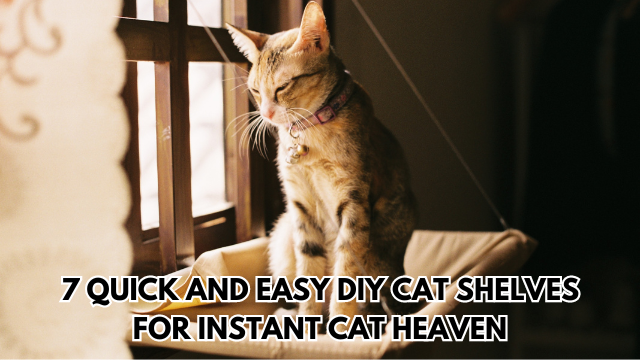If you’ve recently brought home a scared kitten, you might be wondering how you can earn their trust. According to studies, early life experiences in cats can have long-lasting effects on their behavior. In fact, if a kitten isn’t socialized by the time they’re 7 weeks old, they might develop anxiety that’s hard to overcome later on. It can feel daunting, but with a little patience and understanding, you’ll help them feel safe in no time.
- Most Common Mistake
- Use Positive Associations
- Softly and Gently
- Body Language
- Playtime
- How Long?
- Bonus Tip
Understanding Scared Kitten
Before jumping into the steps, it’s important to understand why your kitten is scared.
New environments, unfamiliar people, or even previous trauma can all play a role.
Remember, everything is brand new to them—from the smells to the sounds of your home. It’s no wonder they might feel a little overwhelmed.
Fear can manifest in several ways:
- Hiding under furniture
- Wide, dilated eyes
- Flattened ears
- Hissing or growling
Don’t take it personally if they’re not immediately cuddling up to you. Trust takes time.
1. Give Them Space
One of the most common mistakes new kitten parents make is trying to force interaction.
It’s tempting to want to shower them with love and affection, but this can actually make things worse. Kittens need space to feel safe.
Instead of approaching them directly, let them come to you.
Set up a safe, quiet spot for them in your home where they can retreat. Make sure it has all the essentials: a litter box, food, water, and a cozy bed.
Over time, they’ll start to explore and feel more comfortable.
Trusted tip: According to the Humane Society, allowing a kitten to hide when they feel scared is a natural response that can help them regain confidence at their own pace. Forcing them out too soon can create more anxiety.

2. Use Positive Associations
Kittens are curious by nature, and one of the easiest ways to earn their trust is through food.
You can create positive associations by offering them treats or wet food when they come near you. It’s a simple yet effective way to show that your presence means something good is coming their way.
When you offer food, avoid making sudden movements or loud noises. Sit quietly and let them approach on their terms. With each feeding, they’ll start to associate you with comfort and safety.
Pro tip: Try using interactive toys during feeding times. This will make the experience more engaging for your kitten, helping them associate playtime with you.
3. Speak Softly and Move Gently
Have you ever noticed how cats respond to sound? Kittens are especially sensitive to loud noises, which can startle them easily.
To build trust, always approach them with calmness. Speak softly to them, even if they don’t seem to understand. Over time, they’ll begin to recognize the soothing tone of your voice and associate it with safety.
Moving gently is just as important.
Abrupt gestures can make your kitten feel like they need to defend themselves. Instead, keep your hand movements slow and predictable.
According to The ASPCA, it’s a good idea to avoid direct eye contact initially, as cats often interpret this as a sign of aggression. Try blinking slowly instead, which is a calming signal in cat language.
4. Respect Their Boundaries
One of the most important things to remember when dealing with a scared kitten is to respect their boundaries.
While you might be eager to pet and cuddle, they might not be ready for that level of affection just yet.
Pay attention to their body language. If they pull back, hiss, or swat, it’s a sign they need more time.
Start with brief interactions, like letting them sniff your hand. Gradually, you’ll be able to pet them, but it’s crucial to go at their pace.
5. Play is a Powerful Tool
Cats, even scared ones, have a natural instinct to play. Playtime can be a fantastic way to bond with your kitten without the pressure of physical touch.
Interactive toys like feather wands or laser pointers can engage their hunting instincts while allowing them to interact with you from a safe distance.
Playing helps build confidence, too. As your kitten becomes more comfortable playing around you, they’ll start seeing you as part of their safe environment. Gradually, you’ll notice they’re less hesitant and more willing to be close.
Research from PetMD highlights that kittens who engage in play sessions with their owners are more likely to form strong bonds, making playtime an essential part of the trust-building process.

6. Patience is Key
One of the hardest parts of building trust with a scared kitten is being patient.
It can be frustrating when progress feels slow, but trust doesn’t happen overnight. It’s essential to remind yourself that each kitten is different, and some may take longer than others to warm up.
Try not to get discouraged by setbacks. One day they might feel brave enough to sit next to you, but the next day they’re back under the bed. That’s okay—it’s all part of the process.
According to a study by International Cat Care, the key to gaining trust is consistency. Show up for your kitten every day, whether that’s feeding, playing, or just sitting nearby. Over time, they’ll learn that you’re a reliable, safe presence in their world.
Bonus Tip: Calming Sprays for Scared Kitten
If you’ve been working on building trust but still feel like progress is slow, consider using Feliway or other calming sprays.
These products mimic the natural pheromones that cats release when they feel safe and relaxed. Spraying it in areas where your kitten hangs out can help reduce anxiety and make them feel more secure.
If your kitten still seems anxious after trying these steps, consider adopting a calm, friendly adult cat as a companion. Sometimes, kittens learn trust by observing other cats who feel safe around you.
Read: 10 Common Mistakes New Kitten Owners Make
Gaining the trust of a scared kitten can be a rewarding but challenging journey. With patience, understanding, and consistency, you’ll slowly see them come out of their shell.
Remember to give them space, create positive experiences, and, most importantly, move at their pace. The bond you’ll form will be worth the wait.
Watch Videos about Cat & Kitten Care on Youtube @naowthecat